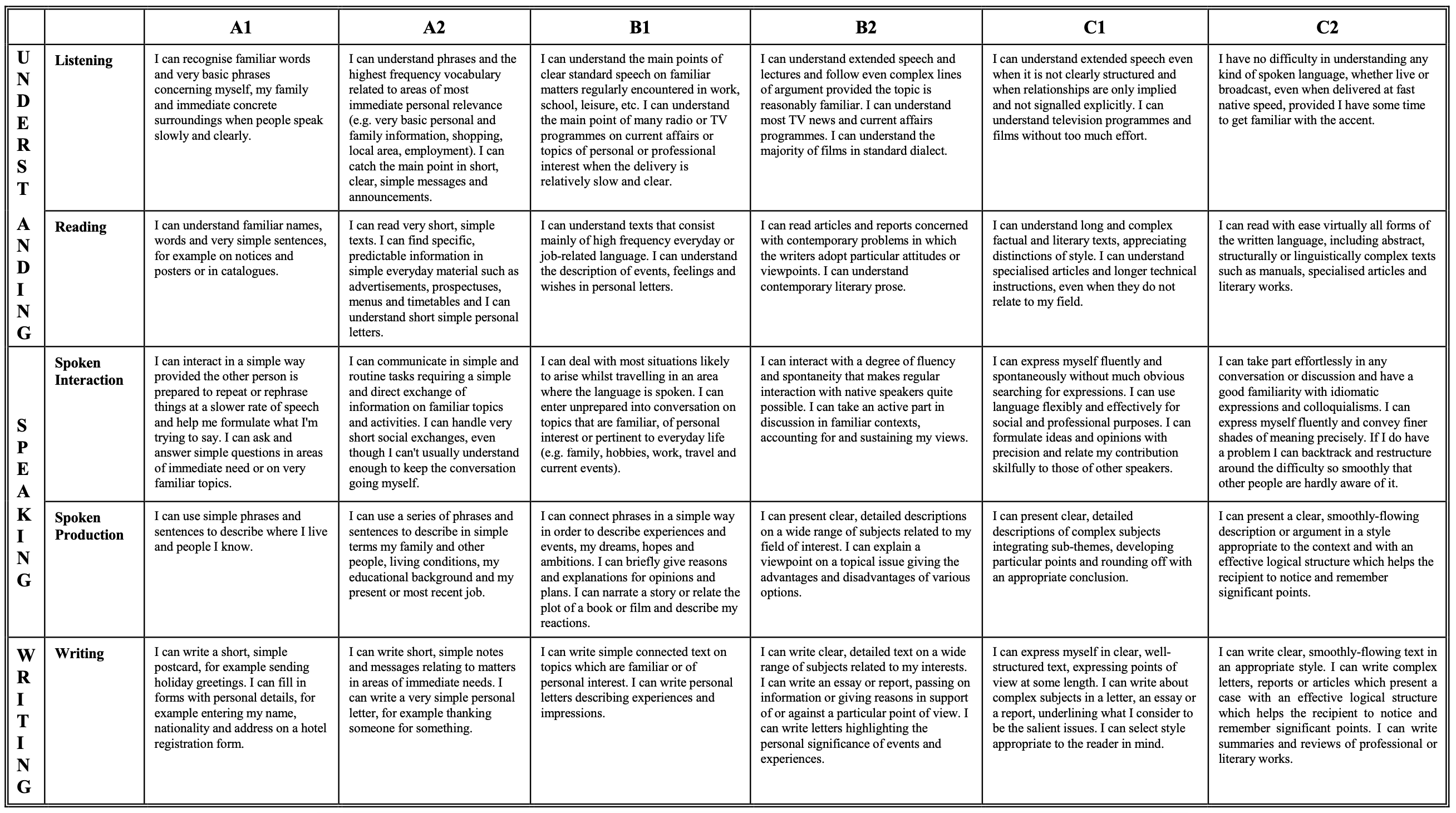The Common European Framework of Reference for Languages (CEFR) is a widely recognized standard for gauging and teaching language proficiency, not just in France but across Europe. For international students aspiring to live and study in France, understanding the CEFR levels is crucial.
CEFR Levels Explained
The CEFR framework is divided into 6 levels, ranging from A1 for beginners to C2 for those who have mastered the language.
Here’s a breakdown of what each level signifies and what students can achieve at each stage:
- A1 (Beginner): At this initial stage, learners can understand and use familiar everyday expressions and basic phrases. The focus is on satisfying immediate needs.
- A2 (Elementary): Users can understand sentences and frequently used expressions related to areas of most immediate relevance (e.g., personal and family information, shopping, local geography, employment).
- B1 (Intermediate): Students can deal with most situations likely to arise while traveling in an area where the language is spoken. They can produce simple connected text on topics that are familiar or of personal interest.
- B2 (Upper Intermediate): At this level, learners can understand the main ideas of complex text on both concrete and abstract topics, including technical discussions in their field of specialization.
- C1 (Advanced): Students can use the language flexibly and effectively for social, academic, and professional purposes. They can produce clear, well-structured, detailed text on complex subjects.
- C2 (Proficiency): At the pinnacle, learners can understand with ease everything heard or read. They can summarize information from different spoken and written sources, reconstructing arguments and accounts in a coherent presentation.

Knowledge per Level
- A1-A2: Basic grammatical structures and a vocabulary of about 1,000 to 2,000 words. Focus on present tense, basic nouns, adjectives, and regular verbs.
- B1-B2: More complex grammatical structures and a vocabulary of 2,000 to 4,000 words. Introduction to past and future tenses, modal verbs, and direct/indirect speech.
- C1-C2: Advanced grammatical nuances and a vocabulary exceeding 4,000 words. Mastery over complex sentences, subtleties in tone, and nuanced expressions.
Progression Path
The amount of study time required to progress through the CEFR levels can vary widely among learners. However, a general guideline is as follows:
- A1: 60–100 hours
- A2: 160–200 hours
- B1: 360–400 hours
- B2: 560–650 hours
- C1: 800–950 hours
- C2: 1000–1200 hours
Learn about the estimated study hours required for each CEFR level and the actual time it takes to learn French in our article: https://gogofrance.com/en/blog/how-long-to-learn-french/
Capabilities per Level
A1 Level
- Can understand and use familiar everyday expressions and very basic phrases aimed at the satisfaction of needs of a concrete type.
- Can introduce themselves and others and can ask and answer questions about personal details such as where he/she lives, people they know, and things they have.
- Can interact in a simple way provided the other person talks slowly and clearly and is prepared to help.
A2 Level
- Can understand sentences and frequently used expressions related to areas of most immediate basic need (e.g., basic personal and family information, shopping, local geography, employment).
- Can communicate in simple and routine tasks requiring a simple and direct exchange of information on familiar and routine matters.
- Can describe in simple terms aspects of their background, immediate environment, and matters in areas of immediate need.
B1 Level
- Can understand the main points of clear standard input on familiar matters regularly encountered in work, school, leisure, etc.
- Can deal with most situations likely to arise whilst travelling in an area where the language is spoken.
- Can produce simple connected text on topics which are familiar or of personal interest.
- Can describe experiences and events, dreams, hopes & ambitions and briefly give reasons and explanations for opinions and plans.
B2 Level
- Can understand the main ideas of complex text on both concrete and abstract topics, including technical discussions in their field of specialisation.
- Can interact with a degree of fluency and spontaneity that makes regular interaction with native speakers quite possible without strain for either party.
- Can produce clear, detailed text on a wide range of subjects and explain a viewpoint on a topical issue giving the advantages and disadvantages of various options.
C1 Level
- Can understand a wide range of demanding, longer clauses, and recognise implicit meaning.
- Can express ideas fluently and spontaneously without much obvious searching for expressions.
- Can use language flexibly and effectively for social, academic, and professional purposes.
- Can produce clear, well-structured, detailed text on complex subjects, showing controlled use of organisational patterns, connectors and cohesive devices.
C2 Level
- Can understand with ease virtually everything heard or read.
- Can summarise information from different spoken and written sources, reconstructing arguments and accounts in a coherent presentation.
- Can express themselves spontaneously, very fluently, and precisely, differentiating finer shades of meaning even in the most complex situations.
Please find the detailed descriptions provided by the Common European Framework of Reference for Languages (CEFR) on Europass website.
Your Roadmap to Proficiency
The CEFR framework provides a clear and detailed roadmap for international students aiming to achieve proficiency in French. By understanding and navigating through the CEFR levels, students can methodically enhance their linguistic skills, from grasping the basics to mastering the language in complex academic, professional and social contexts.
Achieving a B2 level is often a critical milestone for those seeking to pursue higher education in France, as it signifies the ability to actively participate in university lectures and engage in everyday communication.
Language Schools Align with the CEFR
Our partnered language schools offer comprehensive French general and specialized classes meticulously designed to align with CEFR levels. This enables students to gradually build up their linguistic abilities from complete beginner to proficiency in a cohesive and integrated manner.
The curriculum is tailored to meet the needs of international students aiming to live and study in France, focusing on real-world applications of the language that will be crucial for success and daily life in a French-speaking environment.
Whether you are starting with the basics or looking to refine and expand your existing skills, our language school partners are equipped to guide you through your journey. Contact us to apply for a language school!











